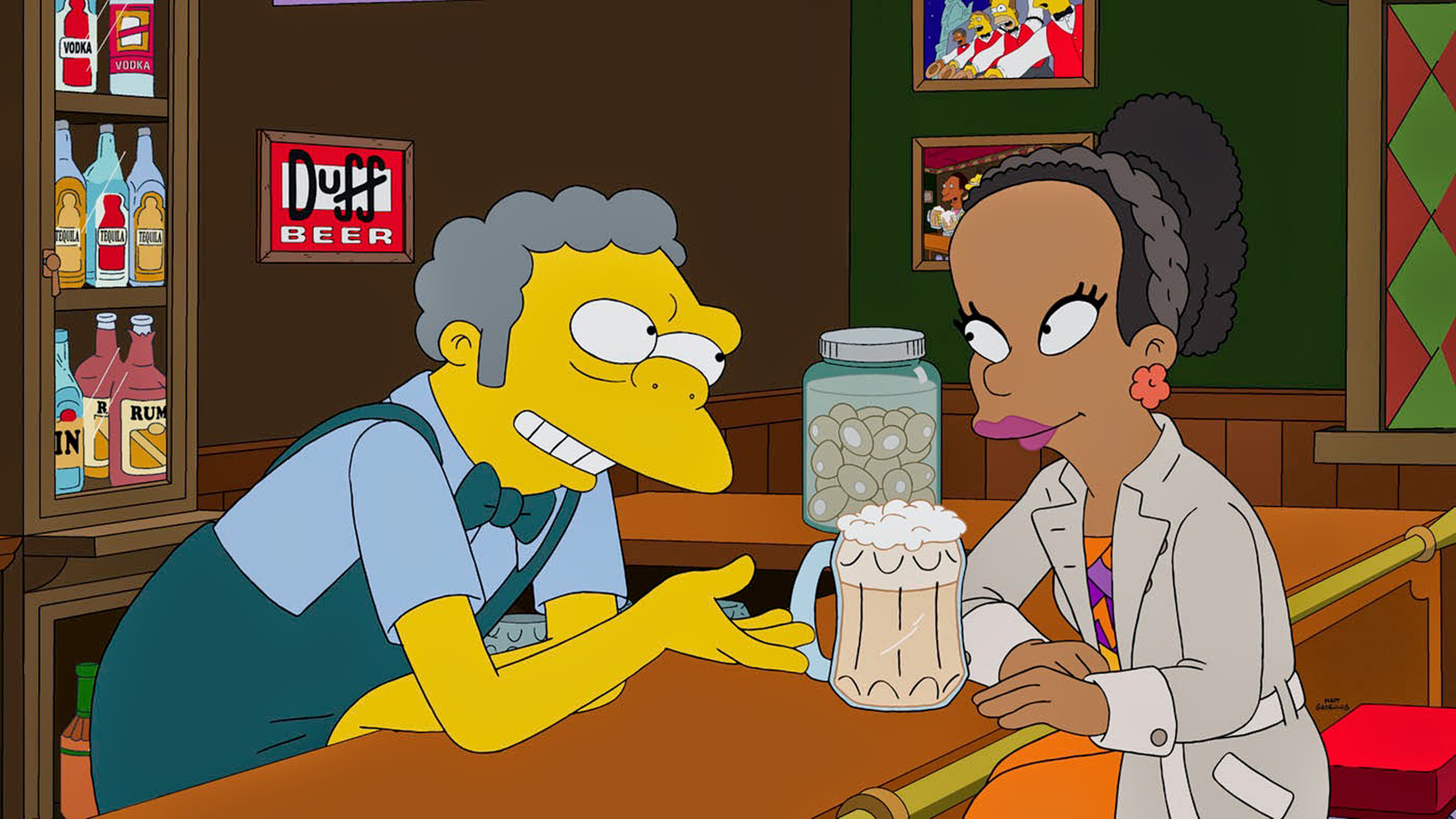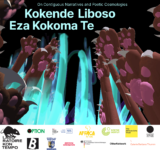Wesley Mead
In the first of a two-part project on The Simpsons, Wesley Mead, while reviewing “The Princess Guide” [s26 e15], examines the decline of The Simpsons, from the cultural touchstone it used to be to a weak, repetitive sitcom at 550+ episodes. The second part will be a collection of comments and reactions to this same episode from writers, cultural thinkers and academics.
The Simpsons is nowhere near the cultural touchstone it once was. As viewership fragments and the show lumbers clumsily into old age, its viewership is way down and its influence on society is less marked than ever before. What was once cutting-edge satire has transitioned to weak, repetitive sitcom. But decline or otherwise, it remains one of the most iconic series in television history, the yellow family at its core recognised the world over, is the closest thing American television has to bona-fide international superstars. With such recognition comes creative and social responsibility, as the creative team behind the show owe it to themselves to challenge viewers’ perceptions, to continue to hone that satirical bent, and— of course— to make their audience laugh.
Currently working its way through its twenty-sixth season, The Simpsons recently featured two Nigerian characters in a major role— a series first. In the episode entitled “The Princess Guide”, broadcast in the US on 1st March 2015, power plant owner Mr. Burns negotiates a uranium deal with a Nigerian king, while Moe the bartender falls in love with his daughter. It’s an outlandish setup— as The Simpsons has grown older, its stories have inevitably become less realistic. (After 550+ episodes, it’s no surprise that the staff writers have to reach further for inspiration.) But it’s also a problematic one, occasionally dogged by stereotype and too often creatively barren, unfunny and even unpleasant. Unfortunately, this rare spotlight for African guests in Springfield failed to do justice to the occasion.
I would never even suggest that the team behind The Simpsons are deliberately racist: they have always claimed to be “equal-opportunity offenders”, and their consistent, scathing satire of the white American male, the series’ longest-running theme, is evidence enough. The problem with “The Princess Guide” is far more insidious: perpetuating tired stereotypes from the Western world’s collective cultural well.
It’s significant that the characters featured are an unnamed King and his daughter, a Princess. This allows for Moe’s initial concern that they are connected to a “Nigerian prince” who had scammed him on the Internet. But in aid of a silly, predictable subplot (one that’s not too timely, either— 419 scams were parodied in Fox stable mate Futurama eight years ago), The Simpsons’ crew have failed in their responsibility to reach beyond the lowest common denominator. Why does the Nigerian have to be a king? Why does his daughter have to be a princess? If the same setup had been played out with a different nationality— even the British, heavily associated with monarchy— it’s difficult to imagine that these guests would have been royals. Why not the Nigerian President, or another politician? Why not a businessman? (This very same episode features Richard Branson in a cameo!) Nigeria is a democracy with a flourishing entrepreneurial sector— surely there were better choices than a wildly inaccurate anachronism.
Such problems seep beyond the character’s profession. The one defining characteristic of his we learn about? A desire to protect his daughter, at whatever cost. It’s disturbingly old-fashioned: “watch that girl like a hawk”, he directs Homer. Later, he is angered at her spending time with a local man (Moe). At one stage, she expresses this concern to Moe: “I don’t want to get my father mad”. It smacks of abuse. It falls to Homer to explain that he must let his daughter choose her own path. It’s condescending and pathetic, and the joke it builds to (“you can’t strangle a girl!”) is not worth the build up.
Other awkward jokes include Burns’ negotiation for uranium: he initially offers a goat, then advances to two goats. These suggestions initially imply more about Burns than they do about the King, as his understanding of Africa is rooted in decades-old knowledge (indeed, Burns’ old-fashioned ways are a common source of humour in The Simpsons). Still, the scene is a little strange nonetheless, partially because it concludes with the King agreeing to a payment of twenty million goats.
The character of Princess Kemi fares better, as the show treats her as the programme’s most sympathetic character. The way her relationship with Moe grows is touching, and feels genuine. It’s also pleasant that he soon overcomes his scam-borne prejudice to appreciate her on a personal level. Independent and three-dimensional, the sequences with Kemi work a lot better than those with Burns and the King. Her relationship with Moe also leads to one of the episode’s strongest jokes, as the creative team find a way to cleverly reference the likes of Ben Okri, Chinua Achebe and Chimamanda Ngozi Adichie as she gifts Moe “some of Nigeria’s most beloved – albeit depressing – literature”. It’s a clever line, sharp, funny and intelligent.
Unfortunately, too much of the show is not on that level. Even in the (few) sequences that don’t involve the Nigerian guests, “The Princess Guide” is not an example of the show firing on all cylinders. It exhibits all of latter-day Simpsons’ negative traits, as character study and social satire is traded in for silly comedy. Lazy jokes abound. An inexplicable subplot featuring Smithers’ homoerotic fantasies particularly grates, as what was once a subtle source of comedy is now a mallet to the viewer’s head. A recurring gag involving clones of Mr Burns would be better suited to one of the show’s non-canon “Treehouse of Horror” Halloween anthologies. The weak attempts at humour don’t stop with the Nigerian characters, for better or worse.
It’s always a pleasure to see more African faces on Western television, and credit is due to The Simpsons’ crew for their attempts to diversify in this episode. Unfortunately, the result is flawed, creatively and culturally. 419 jibes and hackneyed character types disappoint and the strength of Princess Kemi is negated by the two-dimensional Nigerian King more redolent of a parody written fifty years ago.
Wesley Mead is an IT worker and pop-culture fanatic from Trowbridge, England. He writes about television, music, film and politics, and takes a particular interest in examining how American media fares in the UK.








Unfortunately, we dont receive the SIMPSONS on the public TV in South Africa. However, I would just like to comment on the choice of a King (rather than a businessman, or even a President) : there is a sort of fascination in the popular belief of people in republics, for aristocracy and an African King is supposed to create some form of magic. It can be unfortunate, the crooks have to show-off to be credible and an African King can be considered as sitting on a fortune in gold, ivory and precious gems. Perhaps is it the reason to choose a King …
Come off it man, it’s a freaking cartoon! Off course they’re gon make fun of and feature the usuals first: the Prince etc. Hopefully the borders of inspiration will deepen subsequently with more Nigerian time on US television.
The episode used common stereotypes that are still relevant today among population of West world. That is the fact. You who wrote this must be of Nigerian origin .I wonder how would you feel if they put in let’s say a cannibal joke ?
There is nothing racist in that episode ,maybe stupid and corny but not racist. You who wrote this are living in England consuming West culture and you seriously believe you are representing mentality of Nigeria and Africa ? Try to learn something about real world.Maybe your racism will start to fade away.
Yeah, i understand.You never had a single gram of racism inside of you.
@McBrainTheReal: “Qui se sent morveux, se mouche”! So, out of a total of roughly 968 words, you chose to have a fixation about 1. It is clear that you are quite touchy about racism (or rather, about feeling accused of it). That begs the question “Did you even read the article or were just sniffing about for the adjective ‘racist’? Anyway, that’s beside the point.
What I would like to know is: in your opinion, the mere fact that one has a stereotype about an issue makes that stereotype relevant? So, if the majority of people in the West believe Africa is a country, that is relevant just because they believe so in their community? What justifies the relevance of a sterotype? The perception of the person/people with the stereotype, or the reality of the person being stereotyped?
In your opinion, Africans (Nigerians in particular) should be clapping and merry because they didn’t go to the point of inserting a “cannibal joke”? And that, because someone lives in Engalnd they can’t have an opinion about an issue concerning the portrayal of Nigeria on TV? I mean, what world do the people of the “West” (who coined the term “global village” with the advent of “globalization”) live in? SMH.
I just write stuff like this off as the current Simpsons being horribly lazy at everything they do these days. The decision to make them Nigerian almost seems like an afterthought. Both the King and the princess seem completely bored and sedate in their line delivery.
Also the “Nigerian princess falls for Moe” plotline is just absolutely horrible to begin with.
I certainly wouldn’t think the current Simpsons writers were perpetuating some sort of agenda because that would suggest actually putting effort into these episodes–something I’d almost never accuse them of.
To paraphrase what you wrote: The Smithers homoerotic subplot was once a subtle source of comedy and is now like a mallet to the head?
I mean, you are going to complain about that?
Come on, we have seen how far those homoerotic subtexts went in his fantasies decades ago in the early seasons. Either you ignored them with closed eyes or you are really reaching here.
Burns popping out of a cake. nude, singing Happy Birthday in the episode Rosebud isn’t all too subtle.